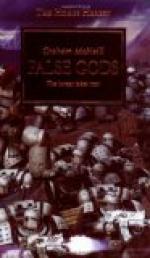She never referred, even indirectly, to her husband, but Simpkins, as he watched her move about the hall, divined that he was often in her thoughts. And there was another whom he watched—Brander; for he felt certain now that the acting president’s interest in his handsome secretary was not purely that of the Egyptologist. And though there was nothing but a friendly courtesy in her manner toward him, Simpkins knew his subject well enough to understand that, whatever her real feelings were, she was far too clever to be tripped into betraying them to him. “She doesn’t wear her heart on her sleeve—if she has a heart,” he decided.
He was trying to make up his mind to force things to some sort of a crisis, one morning, when Mrs. Athelstone called him to her desk and said rather sharply:
“You’ve been neglecting your work, Simpkins. Isis looks as if she hadn’t been dusted since you came.”
This was the fact. Simpkins never passed the black altar without a backward glance, as if he were fearful of an attack from behind. And he had determined that nothing should tempt him to a tete-a-tete with the statue behind the veil. But having so senseless, so cowardly a feeling was one thing, and letting Mrs. Athelstone know it another. So he only replied:
“I’m very sorry; afraid I have been a little careless about the statue.” And taking up a soft cloth, he walked toward the altar.
It was quite dark behind the veil; so dark that he could see nothing at first. But after the moment in which his eyes grew accustomed to the change, he made out the vague lines of the statue in the faint light from above. He set to work about the pedestal, touching it gingerly at first, then more boldly. At length he looked up into the face, blurred in the half-light.
When he had finished with the pedestal he pulled himself up between the outstretched arms, and perhaps a trifle hurriedly now, as he saw the face more distinctly, began to pass the cloth over the arms and back.
Then, quick as the strike of a snake, the arms crushed him against the stone breast. He could not move; he could not cry out; he could not breathe. The statue, seen from the level of the pedestal, had changed its whole expression. Hate glowed in its eyes; menace lived in every line of its face. The arms tightened slowly, inexorably; then, as quickly as they had closed, unclasped; and Simpkins half-slid, half-fell to the floor.
When the breath came back into his lungs and he found himself unharmed, he choked back the cry on his lips, for in that same moment a suspicion floated half-formed through his brain. He forced himself to climb up on the pedestal again, and made a careful inspection of the statue—but from behind this time.
The arms were metal, enameled to the smoothness of the body, and jointed, though the joints were almost invisible. The statue was one of those marvelous creations of the ancient priests, and once, no doubt, it had stood behind the veil in some Egyptian temple to tempt and to punish the curiosity of the neophyte.




